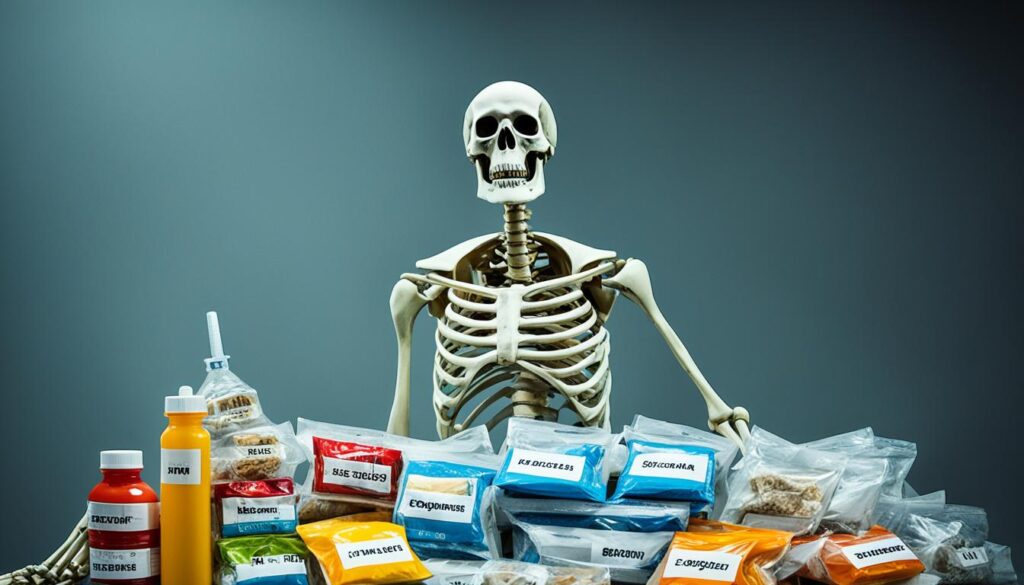
Heroin addiction is a devastating issue that affects countless individuals around the world. Along with its various health risks, heroin use is often associated with significant weight loss. Many heroin addicts experience sudden weight loss as one of the first physical signs of addiction. This prompts the question: does heroin make you lose weight?
Heroin, an opioid derived from morphine, can have powerful effects on the body. Opioids like heroin bind to the brain’s opioid receptors, altering pain perception and producing a sense of euphoria. However, these drugs also affect other bodily functions, including appetite and digestion.
The suppressive effect of heroin on appetite can lead to a decrease in food intake, resulting in weight loss. Heroin use can also cause nausea and vomiting, further contributing to decreased appetite and weight loss. Additionally, the financial burdens associated with addiction may lead individuals to prioritize drug purchases over basic needs like food, exacerbating the issue of malnutrition and weight loss.
Key Takeaways:
- Heroin addiction is often accompanied by significant weight loss.
- The suppressive effect of heroin on appetite contributes to weight loss.
- Nausea and vomiting caused by heroin use can further decrease appetite and lead to weight loss.
- The financial burdens associated with addiction may lead to malnutrition and exacerbate weight loss.
- Seeking professional help and treatment options is crucial for addressing heroin addiction and its physical consequences.
Physical and Behavioral Signs of Heroin Addiction
Heroin addiction can have both physical and behavioral manifestations that indicate its presence. Recognizing these signs is crucial in identifying heroin addiction and seeking appropriate help. Here are some of the common physical and behavioral signs to look out for:
Physical Signs:
- A persistent cough
- Dry mouth
- Nosebleeds
- Constipation
- Pinpoint pupils
- Flu-like symptoms
- Runny nose
- Loss of menstrual cycle
- Sexual problems in men
- Disorientation
- Slurred speech
- Poor hygiene
Behavioral Changes:
- Restlessness
- Excessive sleep or sleepiness
- Declining performance in school or work
- Apathy
- Hostility
- Lack of motivation
- Withdrawal from loved ones
- Avoidance of eye contact
- Wearing sunglasses more than usual
Moreover, the presence of drug paraphernalia is often an indication of heroin addiction. Some common drug paraphernalia associated with heroin use include syringes, spoons, foil, straws, and empty baggies.
It is important to note that these signs and symptoms may vary from person to person, and not everyone may exhibit all of them. If you suspect someone may be struggling with heroin addiction, it is crucial to encourage them to seek professional help and support.
| Physical Signs | Behavioral Changes | Drug Paraphernalia |
|---|---|---|
| A persistent cough | Restlessness | Syringes |
| Dry mouth | Excessive sleep or sleepiness | Spoons |
| Nosebleeds | Declining performance in school or work | Foil |
| Constipation | Apathy | Straws |
| Pinpoint pupils | Hostility | Empty baggies |
Effects of Heroin Use on Weight
When it comes to the effects of heroin use on weight, the impact can be significant. Heroin has a suppressive effect on appetite, leading to a decrease in food intake and subsequent weight loss. This appetite suppression can be a contributing factor to the weight changes observed in individuals struggling with heroin addiction.
Furthermore, heroin addiction often brings about financial struggles, with individuals prioritizing the purchase of drugs over meeting basic needs like food. This can result in malnutrition and further weight loss, exacerbating the already detrimental effects of heroin on the body.
However, it is important to note that not all individuals experience weight loss as a result of heroin use. Some may resort to using other substances, such as marijuana, to control the nausea that heroin use can induce. Marijuana has well-known effects of increasing appetite, leading to weight gain in some individuals.
It is crucial to recognize the potential weight-related consequences of heroin use, including appetite suppression, malnutrition, and fluctuating weight. Addressing these issues and seeking professional help for heroin addiction is vital for overall health and well-being.
Risks of Malnutrition due to Heroin Use
Malnutrition is a common concern among individuals struggling with heroin addiction. The decreased food intake caused by heroin’s appetite-suppressing effects can lead to a lack of essential nutrients, vitamins, and minerals. This can result in various health complications, including:
- Weak immune system, making individuals more susceptible to infections and illnesses
- Unhealthy weight loss, leading to muscle wasting and weakness
- Poor wound healing and delayed recovery from injuries
- Impaired cognitive function and reduced mental clarity
Recognizing the risks of malnutrition and addressing them through proper nutrition and addiction treatment is crucial for individuals on the path to recovery from heroin addiction.

| Effects of Heroin Use on Weight | Description |
|---|---|
| Appetite Suppression | Heroin suppresses appetite, leading to decreased food intake and subsequent weight loss. |
| Malnutrition | Heroin addiction can result in financial issues, which may lead to prioritizing drug purchase over food, contributing to malnutrition and further weight loss. |
| Weight Fluctuations | While heroin use generally causes weight loss, some individuals may use other substances to control nausea, leading to weight gain due to increased appetite. |
Understanding the effects of heroin on weight is crucial in recognizing and addressing the complexities associated with heroin addiction and its impact on physical health.
Physical Impact of Heroin Use
Heroin use can have significant physical effects on the body, leading to various detrimental consequences. These physical impacts include memory issues, impaired cognition, reduced immunity, and deterioration of coordination and motor function.
The use of heroin can result in memory problems, making it challenging for individuals to recall information accurately. This can affect their daily lives, including work, relationships, and overall functioning.
Additionally, heroin use can lead to impaired cognition, affecting the ability to think clearly, make rational decisions, and engage in critical thinking. This cognitive impairment may result in difficulties in problem-solving, concentration, and learning.
Moreover, heroin use can have a negative impact on the immune system, reducing its effectiveness in fighting off infections and diseases. This weakened immunity puts individuals at a higher risk of developing health complications.
Furthermore, prolonged heroin use can contribute to a decline in coordination and motor function. This can manifest as difficulties in performing basic tasks, such as walking, speaking, and maintaining balance.
It is important to address these physical effects of heroin use and seek professional help for addiction. By seeking appropriate treatment and support, individuals can mitigate potential long-term complications and work towards restoring their physical well-being.
To fully understand the physical effects of heroin use, the following table outlines the key impacts:
| Physical Effects | Description |
|---|---|
| Memory Issues | Heroin use can lead to memory problems, affecting an individual’s ability to recall information accurately. |
| Impaired Cognition | Heroin use can impair cognitive function, making it difficult for individuals to think clearly, make rational decisions, and engage in critical thinking. |
| Reduced Immunity | Heroin use weakens the immune system, making individuals more susceptible to infections and diseases. |
| Deterioration of Coordination and Motor Function | Prolonged heroin use can result in a decline in coordination and motor function, causing difficulties in performing basic tasks. |
Note: The physical effects of heroin use can vary for each individual and may depend on factors such as the duration and intensity of drug use, as well as individual health and genetic factors.

Conclusion
Heroin addiction is a devastating condition that requires immediate attention and intervention. Recognizing the physical signs and behavioral changes associated with heroin abuse is crucial in identifying and addressing the problem. If you suspect that a loved one may be struggling with heroin addiction, it is essential to seek professional help and explore treatment options for addiction recovery.
There are resources available to provide specialized heroin addiction treatment programs. The Recovery Village and Woburn Wellness are reputable organizations that offer comprehensive support and personalized treatment plans. Seeking help and support is the first step towards a healthier future.
Remember, recovery from heroin addiction is possible. With the right treatment and support, individuals can regain control of their lives and overcome the challenges associated with addiction. If you or someone you know is struggling with heroin addiction, do not hesitate to seek help. Reach out today and take the first step towards a brighter and healthier tomorrow.






